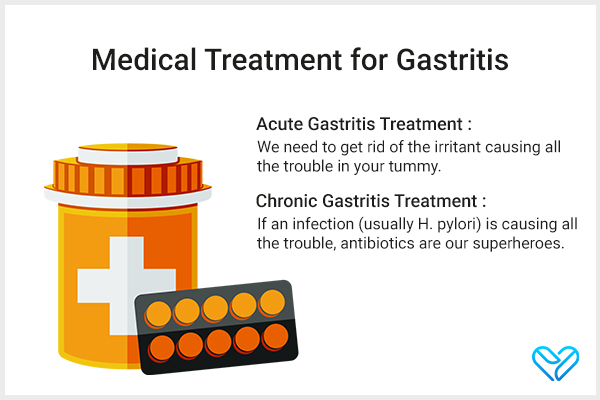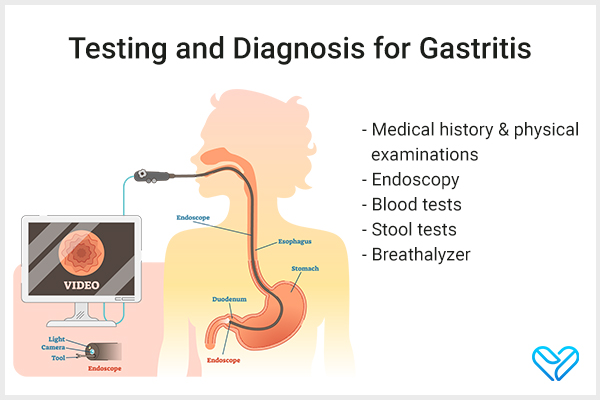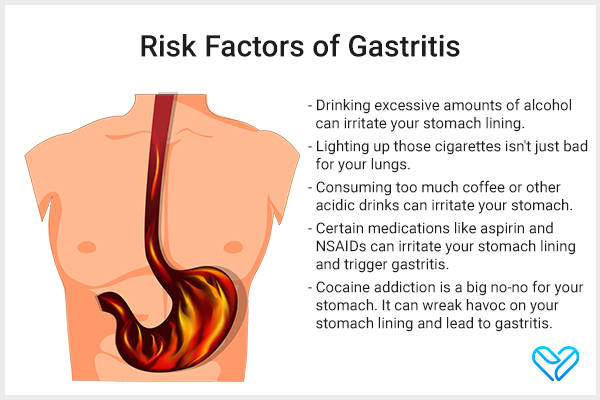In this article:
The stomach has protective membranes that defend it against acid and germs. Sometimes, these membranes can become irritated or damaged, leading to inflammation known as gastritis.

Gastritis can occur due to bacterial infection or the frequent use of anti-inflammatory painkillers. (1)
There are two types of gastritis. The first type is acute gastritis, which is a short-lived stomach inflammation that manifests as pain and unusual bowel movements that usually go away on their own after a few days.
The second type is chronic gastritis. This one is a bit trickier because it may not show any obvious signs, and you won’t even know it’s there until stomach ulcers show up. (1)
Acute gastritis is very common; around 20 in 100 people experience acute gastritis at some point in their lives. Most women tend to get gastritis between the ages of 45 and 64 years. In men, it tends to pop up more often after the age of 65 years. (1)
Read on to know more about gastritis.
Other Types of Gastritis
Apart from acute and chronic gastritis, there are also a few other types of gastritis.
1. Gastritis caused by physical agents
Gastritis due to physical agents happens when the stomach is damaged by things such as radiation and strong acidic substances.
For instance, radiation exposure can make the stomach very inflamed and can cause serious problems such as blockages and holes in the stomach.
2. Infectious gastritis
Infectious gastritis is rare, but it can happen when organisms such as Mycobacterium avium and herpes simplex invade the stomach after a lack of blood flow, eating harmful substances, being exposed to radiation, or other events.
This can cause a lot of pain in the stomach and is a serious condition with a high risk of death. (2)
3. Autoimmune atrophic gastritis
Autoimmune atrophic gastritis (AAG) is a long-term condition that affects the upper part of the stomach. It happens when the body’s immune system mistakenly attacks the cells in the stomach. AAG is often seen alongside other autoimmune disorders.
The damage to the stomach cells can cause increased levels of a hormone called gastrin and lower levels of stomach acid, which can raise the risk of certain cancers. It’s important to diagnose AAG early and monitor it regularly. (3)
4. Postgastrectomy gastritis
Postgastrectomy gastritis refers to the inflammation and atrophy of the stomach that occurs after a partial or subtotal removal of the stomach through surgery, except in cases of gastrinoma.
This condition can lead to changes in the stomach lining and reduced production of digestive juices, which can cause digestive problems and discomfort.
Causes of Gastritis
Here are some common causes of gastritis.
1. Bacterial invasion
Helicobacter pylori is bacteria that disrupt the balance of stomach acid and can damage the lining of your stomach. However, not everyone who has these bacteria gets gastritis.
Remember, H. pylori is a common germ that can infect the stomach and cause problems such as stomach inflammation, ulcers, and even stomach cancer. Sometimes, it does not manifest any symptoms, but it can also cause stomach discomfort.
Doctors can diagnose it by doing a breath test or taking samples during an endoscopy. (1)(2)
2. Painkillers (NSAIDs)
Anti-inflammatory painkillers include aspirin and ibuprofen. If you use them for a short time to tackle pain, they do no harm. However, if you take them for longer periods, they can impair the stomach lining’s protective function. (1)
3. Smoking and spicy food
Smoking, stress, and certain foods can be bad for your stomach. Fatty, sugary, and spicy dishes can irritate the stomach lining and cause problems. Also, too much alcohol can give you an acute case of gastritis. (1)
4. Bile juice
Sometimes, bile from the small intestine might flow back into the stomach. This is damaging to the stomach lining and can cause gastritis. (1)(2)
Symptoms of Gastritis
A bad stomach ache is the most common sign of acute gastritis. Other signs include: (1)
- Feeling full even if you’ve only had a few bites
- Heartburn or a feeling of burning in your chest
- Nausea and sometimes vomiting
- Burping more than usual
- No desire to eat, known as loss of appetite
- Stomach bloating
Some people may also experience hematemesis (vomiting blood), melena (black, tarry stools), and nasogastric bleeding within the first week of the issue.
Note: These symptoms can also be signs of other conditions such as acid reflux, an irritable tummy, and gastroenteritis. If you have chronic gastritis, the symptoms might be milder or even invisible. (1)
Treatment for Gastritis

Gastritis can be treated in the following ways.
Acute gastritis treatment
To calm down the acid in your stomach, you will be prescribed medicines such as basic antacids, H2 antagonists, and proton pump inhibitors.
Some experts also suggest the use of oral antacids and recommend prophylaxis with acid-suppressing drugs to reduce acute stress gastritis, especially for high-risk patients in the ICU.
For nausea, antinausea medicines are given. (4)
Chronic gastritis treatment
Treatment for chronic gastritis is a bit complicated. If an infection (usually H. pylori) is causing all the trouble, antibiotics are used to eliminate the infection and prevent gastritis from getting worse.
Note: The usual approach involves using a special type of medication called a proton pump inhibitor along with two different antibiotics.
Sometimes, chronic gastritis can disturb the body’s vitamin B12 levels, and you may need injections to make up for the deficiency. If your stomach lining has undergone some serious changes that could lead to cancer, your doctor may recommend an upper endoscopy every year or so. (4)
Testing for and Diagnosing Gastritis

When your doctor suspects gastritis, they will run a few tests to figure out what’s going on.
1. Medical history and physical examinations
Your doctor will ask you about your medical history, symptoms, and medications. Next, they’ll conduct a noninvasive physical exam that includes looking for noticeable signs. (5)(1)
2. Endoscopy
Sometimes, doctors suggest an upper gastrointestinal (GI) endoscopy, which involves using a flexible tube with a camera called an endoscope to look at the lining of your esophagus, stomach, and duodenum (the first part of your small intestine).
They may even take small tissue samples (biopsies) to examine under a microscope. (5)(1)
3. Blood tests
Blood tests involve taking a small sample of your blood to check for other causes of gastritis or signs of complications. It’s a quick way to gather important information. (5)(1)
4. Stool tests
Stool tests can help detect H. pylori and check for signs of bleeding in your stomach. (5)
5. Breathalyzer
A urea breath test is used to detect the presence of H. pylori in your digestive tract.
You will be given a substance containing urea to swallow. If H. pylori is present, it will convert the urea into carbon dioxide. You will then exhale into a container, and medical professionals will analyze your breath for specific carbon atoms. This test is a great method to identify an H. pylori infection. (5)
Risk Factors of Gastritis
Some factors that can put you at risk for gastritis are: (6)

- Drinking excessive amounts of alcohol can irritate your stomach lining and lead to acute gastritis.
- Cigarettes aren’t just bad for your lungs; they can also contribute to gastritis.
- Consuming too much coffee or other acidic drinks can irritate your stomach, making it more susceptible to gastritis.
- Certain medications such as aspirin and nonsteroidal anti-inflammatory drugs (NSAIDs) can irritate your stomach lining and trigger gastritis.
- Cocaine addiction can be very harmful to your stomach lining and lead to gastritis.
- Excessive stress can trigger your stomach to produce extra acid, which can irritate the lining.
- Bacterial gastroenteritis, aka food poisoning, can also cause gastritis.
- Certain autoimmune disorders such as pernicious anemia, Hashimoto’s disease, and type 1 diabetes can harm your stomach and increase the risk of gastritis.
- Severe infections caused by viruses or parasites can also irritate your stomach and contribute to gastritis.
- A low-fiber diet and high consumption of processed foods can upset your stomach and make it prone to gastritis.
Complications of Gastritis
The complications of gastritis include: (2)
- Peptic ulcer: Painful sores form in the stomach lining.
- Chronic atrophic gastritis: Stomach glands start disappearing, usually because of H. pylori.
- Gastric dysplasia: Stomach cells undergo some changes, which can increase the risk of developing gastric cancer.
- Iron-deficiency anemia: Gastritis can cause long-term inflammation and damage, leading to low iron levels in your body.
- Vitamin B12 deficiency: Your immune system might start attacking the cells that help absorb vitamin B12.
- Gastric bleeding: In severe cases of gastritis, the inflammation can cause bleeding in the stomach.
- Achlorhydria: Gastritis can reduce the production of stomach acid, causing some digestive troubles.
- Gastric perforation: In rare cases, the inflammation can lead to a hole or tear in the stomach lining.
- Mucosa-associated lymphoid tissue (MALT) lymphoma
- Neuroendocrine tumors (NET): Tumors can develop in the stomach due to autoimmune gastritis.
- Nutrient deficiencies: Gastritis can damage your body’s ability to absorb important nutrients such as vitamin C, vitamin D, folic acid, zinc, magnesium, and calcium.
Final Word
Gastritis is a common condition that can cause inflammation and discomfort in the stomach. It can be triggered by factors such as bacterial infection, painkillers, smoking, stress, and certain foods.
It’s important to recognize the symptoms, seek medical attention for diagnosis, and follow the recommended treatments to alleviate the discomfort and prevent further complications.
By understanding the causes, risks, and treatment options for gastritis, you can take steps to protect your stomach health and maintain your overall well-being.
 Continue Reading9 Home Remedies for Gastritis and Tips to Prevent It
Continue Reading9 Home Remedies for Gastritis and Tips to Prevent It
- Was this article helpful?
- YES, THANKS!NOT REALLY


